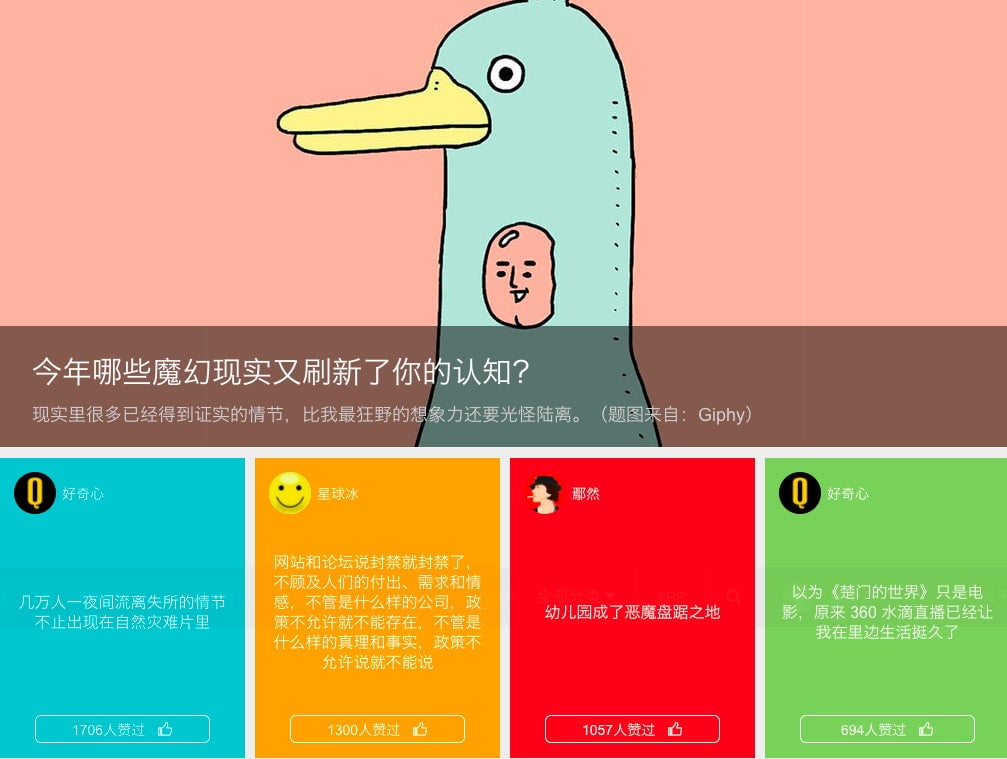China’s real-life magic realism of 2017, according to Chinese netizens
In the literary genre of magic realism, made popular by Latin American authors, fantastical elements emerge in an otherwise mundane, rational world. In China, the term is beloved by netizens who use it when surfacing the absurd in political and social phenomena they witness daily. It can describe a doctor who uses electric shocks to treat internet addiction in teenagers, or a top Buddhist monk who professes deep love for the Communist Party, to name just a few examples.


In the literary genre of magic realism, made popular by Latin American authors, fantastical elements emerge in an otherwise mundane, rational world. In China, the term is beloved by netizens who use it when surfacing the absurd in political and social phenomena they witness daily. It can describe a doctor who uses electric shocks to treat internet addiction in teenagers, or a top Buddhist monk who professes deep love for the Communist Party, to name just a few examples.
Earlier this week, Shanghai-based news site Q Daily published an opinion poll asking “What magic realism event of the year is beyond your understanding?” The idea, Q Daily explains, is to let users write about the real-life events that are “even more strange and disturbing than our wildest imagination,” and then vote for these posts with 👍. The poll instantly went viral before it got censored, not surprisingly. During its roughly 24-hour lifespan, the poll attracted nearly 20,000 participants, among the highest of any polls run by the site.
Indeed, the Q Daily poll is a reflection of China’s fears of the year. On top of everyone’s list of worries is the sense of deep insecurity in dealing with a repressive government, no matter whether they’re working class, middle class, or even upper class in China. That sentiment deepened over the year each time another controversial political or social event took place, and the following most-liked responses to Q Daily’s question reflected that.

Mass evictions of migrants in Beijing
“It’s not only a scene from a natural disaster movie when tens of thousands of people were displaced overnight.” 👍 1706
In November, tens of thousands of Beijing residents were forced out of their homes, as the city government embarked on a 40-day crackdown on illegal dwellings in the aftermath of a fire that killed over a dozen people earlier the same month. The forced evictions led to public anger as many people felt they unfairly targeted hard-working migrant workers in a bid to cap the Chinese capital’s population. The term “low-end population” at one point took over China’s internet and was used as shorthand to refer to prejudice towards migrants—until censors took action.
Censorship
“The government bans whatever website or forum it wants to ban, regardless of our dedication, demand and feelings. No matter what company it is, it’s non-existent if policies don’t allow it. No matter what the truth or fact it is, it’s unspeakable if policies don’t allow it.” 👍 1300
China traditionally arrests dissidents, censors online discussions, and blocks foreign services—including Facebook and Google—that are deemed hostile to the regime. The systematic oppression of free speech have grown harsher this year, with foreign NGOs being forced to leave the country, anonymity on the internet pretty much killed, and the use of VPNs—major tools to skirt around China’s Great Firewall—facing a harsh crackdown under a slew of new regulations.
Child-abuse scandals
“Kindergartens are occupied by devils.” 👍 1057
A high-end Chinese kindergarten chain was accused of child abuse in November after parents said they found their children appeared to have needle marks and were given unidentified pills. Authorities censored online discussions of the incident, and later denied that any abuse had happened, much to the anger of members of China’s affluent middle class who have come to realize that they are no exception to the risks of living in an authoritarian state with limited tolerance for their demands.
Nearly 60 child-abuse scandals have been uncovered in kindergartens in China since 2010, according to Chinese business publication Caixin (link in Chinese).
Camera surveillance
“I thought The Truman Show is just a movie, but now I realize that I’ve lived there for quite a long while, thanks to 360’s live-streaming platform Water Drop.” 👍 694
Chinese cybersecurity firm Qihoo 360 said earlier this week that it had shut down its controversial live-streaming platform amid concerns over violation of privacy. The Water Drop platform offered real-time public streams from 360’s surveillance video cameras installed in locations such as yoga studios, restaurants, and kindergartens. Chinese netizens are now wondering: What indeed are the limits on the uses of surveillance technology?
China is rolling out the world’s largest camera-surveillance network, with 179 million CCTV cameras already in place nationwide and an estimated 400 million new ones coming in the next three years. The nation is also building a facial-recognition database that aims to identify any Chinese citizens within three seconds.
Xi Jinping’s power play
“I’ve seen the emperor ascending the throne in my lifetime. How shall we name his dynasty?” 👍 316
China’s president Xi Jinping emerged from a pivotal Communist Party event this year as the most powerful man to rule the country in a generation, with his name and ideology enshrined into the party constitution. Previously only the nation’s founding father, Mao Zedong, had enjoyed that privilege while still in power.
Xi’s iron grip and cult of personality have become more visible since he entered his second five-year-term in October as China’s paramount leader, with a third term on the cards.